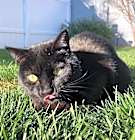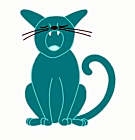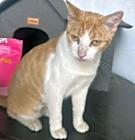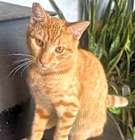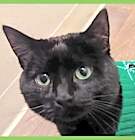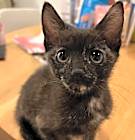Color
Gray or Blue
Size
(when grown) -
Details
Not good with kids
Not good with dogs
Not good with cats
Spayed or Neutered
Shots are up-to-date
Story
Meet Blue!
A lively two-year-old Domestic Shorthair from Tucson, AZ, whose bold personality shines as bright as his sleek blue-gray coat. This charismatic feline is the life of the party, always ready to engage, explore, and soak up all the attention he can get. If you're looking for a cat who brings energy, charm, and a touch of mischief into your home, Blue might just be your perfect match!
Blue is a social butterfly who thrives on interaction with his favorite humans. Whether he's playfully chasing after tiny objects he’s "discovered" on the floor or trilling excitedly when it’s time for his beloved wet food, he keeps life entertaining. His curious nature means he’s always investigating, always moving, and always on the lookout for his next adventure. He’s an affectionate companion, happy to shower his pet parent with love, but he’s also confident and knows exactly what he wants—preferably your undivided attention and plenty of playtime.
While Blue adores people, he prefers to be the one and only cat in his home. As an alpha male, he enjoys ruling his domain and isn’t too keen on sharing his space with other felines. His ideal home is one where he can be the center of attention, engaging in interactive play and soaking up the affection of a dedicated pet parent. He’s an indoor-only cat, and given his high-energy personality, he’d do best in a home where he won’t be left alone for long periods.
This handsome boy is in great health, up-to-date on vaccinations, and neutered. His tipped ear is a little reminder of his past, but it only adds to his unique charm. Blue is ready to bring his playful spirit, endless curiosity, and affectionate nature into a new loving home. Could he be the perfect fit for you?
If you're ready for an energetic, social companion who will keep you on your toes and fill your home with laughter, reach out to adopt@joyfulpets.com and make Blue a part of your family today!



